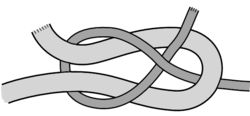(Marked this version for translation) |
|||
| (6 intermediate revisions by the same user not shown) | |||
| Line 1: | Line 1: | ||
| − | <noinclude><translate><!--T: | + | <noinclude><translate><!--T:2--> |
</noinclude> | </noinclude> | ||
{{Knot | {{Knot | ||
| name = Sheetbend | | name = Sheetbend | ||
| image = Schotstek1.png | | image = Schotstek1.png | ||
| − | | use = The sheet bend knot is excellent for joining two ropes together, especially if the two ropes are not the same size. | + | | use = The sheet bend knot is excellent for joining two ropes together, especially if the two ropes are not the same size. When tied properly, it will not come undone, and it is easy to untie. It is very similar to the bowline. |
|tying_instructions = | |tying_instructions = | ||
| − | # Make a bight at the end of the larger rope (if they are not the same size). | + | # Make a bight at the end of the larger rope (if they are not the same size). |
# Run the end of the smaller rope through the bight, entering from the bottom. | # Run the end of the smaller rope through the bight, entering from the bottom. | ||
# Wrap the end of small rope around the back of the large rope, crossing the short end of the large rope first. | # Wrap the end of small rope around the back of the large rope, crossing the short end of the large rope first. | ||
| Line 12: | Line 12: | ||
}} | }} | ||
<noinclude></translate></noinclude> | <noinclude></translate></noinclude> | ||
| − | |||
| − | |||
| − | |||
Latest revision as of 03:40, 27 July 2022
| Sheetbend |
|---|
|
Use: The sheet bend knot is excellent for joining two ropes together, especially if the two ropes are not the same size. When tied properly, it will not come undone, and it is easy to untie. It is very similar to the bowline.
How to tie:
|

